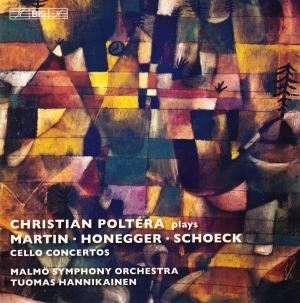 |
 |
|


alternatively
CD: MDT
AmazonUK
BIS Downloads
available from eclassical.com
|
Frank MARTIN (1890-1974)
Concerto for Cello and Orchestra (1966) [24:18]
Arthur HONEGGER (1892-1955)
Concerto for Cello and Orchestra, H.72 (1929) [15:10]
Othmar SCHOECK (1886-1957)
Concerto for Cello and String Orchestra, Op.61 (1947) [32:06]
 Christian Poltéra (cello)
Christian Poltéra (cello)
Malmö Symphony Orchestra/Tuomas Hannikainen
rec. January 2006 (Schoeck), June 2007 (Martin, Honegger) Malmo
Concert Hall, Malmo, Sweden
 BIS BIS-CD-1737 [72:39]
BIS BIS-CD-1737 [72:39]
|
|
|
This BIS release comprises three twentieth-century cello concertos
by composers with strong connections to Switzerland. All three
Poltéra recordings have been released previously on BIS.
I know and much admire Christian Poltéra’s work
as a member of the outstanding string ensemble Trio Zimmermann
with violinist Frank Peter Zimmermann and violist Antoine Tamestit.
Frank Martin was born in Geneva, Switzerland but resided in
several European cities before settling in Holland in 1946 which
remained his home until his death in 1974. Undoubtedly Martin’s
best known composition is his Mass for Double Choir (1922,
rev. 1926). Martin wrote a number of concertante works and the
one I know best is the Petite Symphonie Concertante for
harp, harpsichord and piano and two string orchestras (1944/45).
Martin’s substantial three movement Cello Concerto
from 1966 - premièred in 1967 by Pierre Fournier - deserves
to be better known. Curiously a pastoral mood that could easily
be a Vaughan Williams depiction of early morning mist in Norfolk
fen country suffuses the opening and closing of the first movement
Lento - Allegro moderato - Lento. In the central section
dominated by tarantella rhythms chromatic writing features
strongly. A mood of reflection irradiates the Adagietto
together with more chromaticism. The highly rhythmic final movement
mixes a range of techniques, tempi and moods. More cerebral
in design than emotional one can understand why this rather
technical score has not entered the general concerto repertoire.
Born in Le Havre, France to Helvetian parents Arthur Honegger
maintained Swiss citizenship throughout his life. He wrote three
concertos starting with the Piano Concertino in 1924
and concluding with a Concerto da Camera for flute, cor
anglais and string orchestra in 1948. Positioned in-between
is the relatively short Cello Concerto from 1929 from
a period during which he was strongly focused on writing scores
for the theatre. It was Maurice Maréchal who gave the
première in 1967. This superb score is cast in three
movements that are played continuously. On many recordings it
is divided into three tracks but for some reason but not here.
The brief cello melody against muted strings in the opening
movement Andante is one of the most engaging moments
in the whole cello repertoire. Sultry and nocturnal, there is
a distinct Coplandesque open air feel underlying the writing.
At 1:04-1:33 the cello adopts a swinging jazzy persona abruptly
interrupted by an explosion of sheer aggression at 1:33-1:49.
I could easily imagine at 3:37-4:11 a seedy pre-war Berlin nightclub
scene. At 4:34-5:38 the glorious opening melody is revisited
in the orchestra with the woodwind having much opportunity to
shine. To conclude the Andante the jazzy cello passage
returns. Soft and gentle sounds that evoke the break of dawn
best describe the cello part in the Lento. In a central
section at 7:51-9:07 the mood becomes one of agitation with
a harsh wailing tone to the already intense cello line. In the
concluding Allegro marcato brisk and rocking music gambols
along in a rather aimless and harmless fashion. Honegger is
certainly adept at creating a colourful atmosphere that is both
varied and fascinating. At 14:26 the glorious Copland-like quality
from the first movement is restated.
It is rare to encounter music by the Swiss composer Othmar Schoeck.
Briefly a pupil of Max Reger in Leipzig, Schoeck moved to Zurich
keeping the Swiss city as his base. It was in Zurich during
the First World War that he became friendly with Ferruccio Busoni
who for a time became his mentor. Schoeck was best known for
writing a very substantial quantity of lieder and some choral
music and stage works including operas. In the early 1930s Schoeck
embarked on a cello concerto but abandoned it. It was in 1947
that Schoeck composed his four movement Concerto for Cello
and Strings that was premiered the next year by Pierre Fournier
in Zurich. At over fourteen minutes in length the opening movement
rather outstays its welcome. The writing never seems to settle
on a particular mood conveying a sense of uncertainty and restlessness.
Predominantly intimate and moody the slow movement drags for
its lack of memorable material with the very short third movement
Presto providing a welcome contrast of tempo. The thickly
textured finale varies considerably in tempi and
weight. Never seeming to settle on one thing or another it is
difficult to categorise a particular mood yet probably the closest
I can get is the word ‘reflection’. As I stated
of the Frank Martin concerto the same lack of sticking power
and uniqueness of inspiration applies to the Schoeck.
Admirably recorded at the Malmo Concert Hall, Christian Poltéra
performs throughout with style and sensitivity. His playing
never sounds self-conscious. He delivers bold playing that he
projects extremely well. Under Tuomas Hannikainen the Malmö
Symphony Orchestra is highly responsive and cannot be faulted.
I remain an admirer of the Honegger’s concise yet marvellously
melodic Cello Concerto and find Poltéra’s
firmly focused and expressive performance slightly superior
to Johannes Moser’s 2010 Kaiserslautern account on Hänssler
Classic CD 93.276. Although well played by Christian Poltéra
try as I might I can’t get inspired by the Martin and
Schoeck scores.
Michael Cookson
|
|




 All Nimbus reviews
All Nimbus reviews








